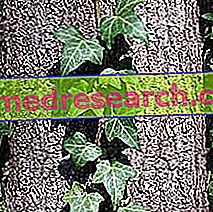
Scientific name
Hedera helix L.Family
AraliaceaeOrigin
EnglandUsed Parts
Drug consisting of leaves
Chemical constituents
- polyacetylenes;
- Flavonoids (quercetin, kampferol; caffeilchinico acid);
- Triterpene saponins (alphaederin and ederagenin);
- Caffeic acid;
- Chlorogenic acid.
Ivy in Herbalist: Property of the Ivy
Mainly anti-inflammatory properties are ascribed to ivy-based preparations, but also sedatives of coughs and antimicrobials (due to alpha-ederine).
The secretolytic and expectorant properties make ivy useful in the presence of convulsive coughs, bronchitis and chronic catarrhal syndromes on an inflammatory basis.
In the literature there are also references to presumed antirheumatic, analgesic, antibacterial, anthelmintic, anti-edema and revulsive activities on skin and mucous membranes.
In cosmetics, ivy extracts are used in purifying cleansing formulations, but also in anti-cellulite products.
Biological activity
The most important properties attributed to ivy are, certainly, those expectorant and antispasmodic. These activities have been confirmed by several clinical studies, so that the use of this plant has been officially approved precisely for the treatment of inflammatory diseases of the airways, coughs and bronchitis.
Indeed, ivy is part of the composition of a drug, in which it is found in association with codeine (Hederix Plan ®), with specific therapeutic indications for the treatment of cough.
The antitussive, expectorant and bronchospasmolytic effects seem to be due to the saponins contained in the plant, especially alpha-ederine.
Several studies have been carried out on alpha-ederine which have also shown its haemolytic and cytotoxic properties.
From another interesting research conducted in vitro, however, it emerged that alpha-ederine - administered in combination with 5-fluorouracil - is able to enhance its activity against malignant colorectal cancer cells. While other studies have shown the existence of a potential antioxidant activity exerted by the alpha-ederine itself.
Ivy against coughs and bronchitis
As mentioned, thanks to the bronchospasmolytic, expectorant and antitussive action exerted by the active ingredients present in the ivy, the extracts obtained from this plant can be used effectively in the treatment of respiratory tract diseases, such as bronchitis and cough with phlegm.
For the treatment of the aforementioned disorders, if the ivy is taken in the form of a dry extract (ratio drug / extract DER 4-8: 1, using ethanol at 30% m / m as extraction solvent), the dose usually recommended in adults is about 15-65 mg of product, to be taken three times a day.
However, for further information about the use of ivy for the treatment of respiratory tract diseases, see the article on "Curing with Ivy".
Ivy in folk medicine and homeopathy
In folk medicine, ivy is used internally for the treatment of disorders of the spleen, gall bladder and liver; as well as being used as a remedy to combat rheumatism, gout and scrofula.
Externally, however, the plant is used in traditional medicine for the treatment of cellulite, corns, skin ulcers, inflammations, wounds, phlebitis, rheumatic disorders and neuralgia.
Ivy is also used in homeopathic medicine, where it can be easily found in the form of granules. In this context the plant is used for the treatment of various disorders, among which we mention: inflammations of the respiratory tract, rheumatism, hyperthyroidism, excessive emotionality, premenstrual leucorrhea and delayed menstrual cycle.
The amount of homeopathic remedy to be taken can vary from one individual to another, also depending on the type of disorder to be treated and the type of homeopathic dilution that must be used.
Side effects
If given in the recommended forms and doses, ivy should not cause any side effects.
However, if high quantities of ivy are taken internally, even serious adverse reactions may occur, such as: diarrhea, nervousness, wheezing, convulsions and coma.
Furthermore, the extract obtained from the leaves could cause sensitization reactions following contact with the skin.
Contraindications
Avoid the use of ivy-based preparations in case of gastritis and peptic ulcer and in case of hypersensitivity to one or more components.
Furthermore, ingestion of ivy leaves and berries is not recommended due to their toxicity.
Pharmacological Interactions
- NSAIDs: possible increase in gastrolesivity;
- Possible reduction in the absorption of some orally administered drugs.
Note
Cases of poisoning due to ingestion of ivy leaves and berries are reported.



